Between the lines, power brokers are easy to spot—it’s called keeping score. But the sports world is really shaped by those who wield influence in more nuanced ways. By controlling wealth and access. By building audiences. By parlaying on-field success into real-life clout. In 2023, these are the 50 most influential figures and forces in sports.

ATHLETES | INFLUENCERS | EXECS | ICONS & LEADERS | DEALMAKERS
Athletes
These fierce competitors have reached the pinnacle of power and prestige through their outsized impact on the field and off.
Patrick Mahomes
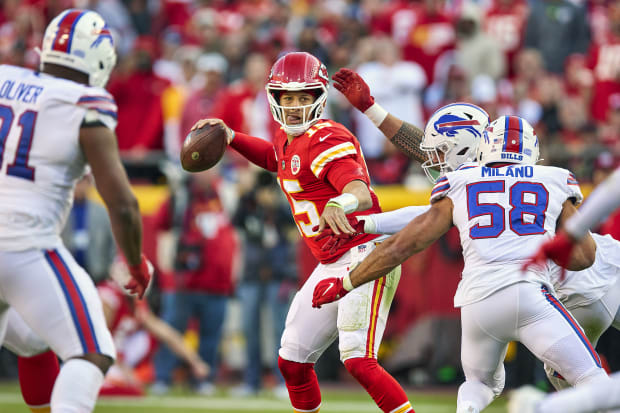
David E. Klutho/Sports Illustrated
If a marketing and image company were to create the modern athlete influencer from scratch, it very well might build someone with all the constituent parts of Patrick Mahomes.
There is the on-field component: The Chiefs’ quarterback maintains a stranglehold on the public consciousness by producing clip-worthy plays with unprecedented regularity—and an ever-increasing awe factor that keeps us from becoming numb to his genius. It’s hard to imagine an athlete in any sport producing more raw sports content to serve the ever-scrolling masses.
There is the career success: Mahomes now has two Super Bowl rings and a contract worth up to $503 million before his 28th birthday—all of which give him a heft few other athletes can match. He is both a young savant and one of the most decorated players in NFL history, already on the list of all-time greats. Attention must be paid to that kind of combination.
Which leads us to perhaps the most important part of Mahomes’s influencer profile: He is incredibly relatable for someone so talented and accomplished. Unlike the health-food-conscious Tom Brady or the Manning brothers—who, even before stepping onto an NFL field, carried with them a whiff of football royalty—Mahomes feels real. Be it his voice, which brilliant internet sleuths have matched in pitch and subject matter to that of HBO Eastbound and Down main character Kenny Powers, his donning of WWE wrestler–style Viper sunglasses or his love of ketchup and Coors Light, Mahomes feels very much like a man of the people.
Mahomes has influence over everything. There are defenses in the NFL designed specifically with stopping him in mind. There are general managers and coaches dreaming of finding the next iteration of Mahomes, scouring the boom-or-bust world of athletically gifted but schematically unproven prospects in college. He is years from his NFL retirement, but his business portfolio is swelling, starting with ownership stakes in a variety of nonfootball franchises: minority stakes in the Royals, MLS’s Sporting Kansas City, the NWSL’s Kansas City Current and (along with Naomi Osaka, Rich Paul and others) a Miami-based pro pickleball team.
And it’s a safe bet that the next generation of successful quarterbacks will follow his lead behaviorally. Mahomes is a great example of how being yourself pays dividends. So long as you are also a generationally talented, multitime world champion athlete playing the country’s most popular sport, of course. —Greg Bishop
Kylian Mbappé

Michael Regan/FIFA/Getty Images
Even with Lionel Messi and Cristiano Ronaldo riding into the sunset of their careers, the beautiful game won’t have to wait long for its next icon. Mbappé is the face of the sport’s future, as PSG’s all-time leading goalscorer and the owner of European soccer’s most lucrative contract, at $100 million per year. At 24, he already has the most followers in France, with more than 100 million, and he’s received the country’s highest civilian honor. Mbappé is Gen Z’s first global sports superstar, and his reach is only expanding. —Andrew Gastelum
Naomi Osaka
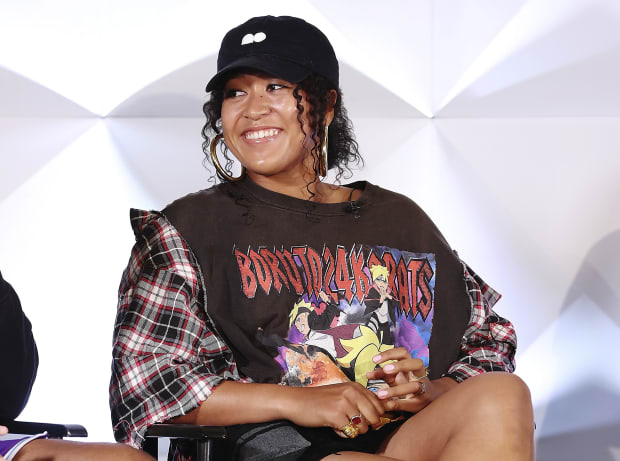
Monica Schipper/Getty Images for Lotte New York Palace
There was a time not long ago when an athlete’s relevance and income moved in more or less direct proportion to their playing results. The rules of the road were simple. Winning brings opportunities (and triggers bonus clauses and beckons biographies). Fail to win, and opportunities dry up. Stop playing entirely, and the gravy train moves on. Beyond that, an athlete speaking openly about their social anxiety and mental health challenges might as well be radioactive to marketers. How can you represent a brand if you’re not willing to be front-facing?
And yet Osaka the pathbreaker—on brand as ever; forgive the pun—has taken this conventional wisdom and batted it back with great force. Her lack of tennis has not dented her earning potential at all. Quite the contrary. Osaka Inc. is as strong as ever. Her list of sponsors, partnerships and investments—too numerous to chronicle fully here—now includes more than 20 brands, from Nike, Victoria’s Secret and Beats to jeans and vegan ramen. For the third straight year, she was the world’s top-earning female athlete, making an estimated $50 million annually from off-court pursuits.
Read more about Osaka’s pathbreaking in tennis, business and more, by Jon Wertheim, here.
Stephen Curry
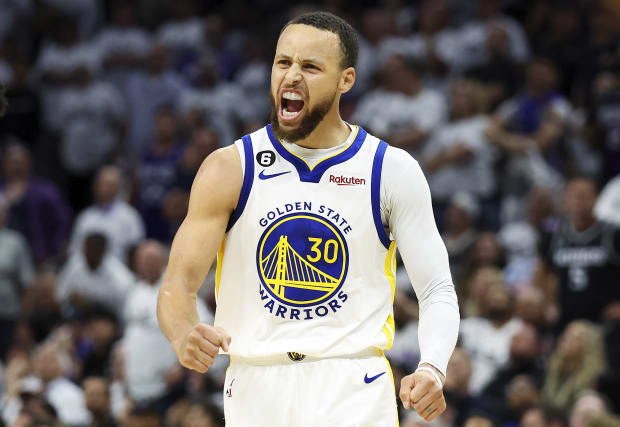
Ezra Shaw/Getty Images
Even casual fans know how the four-time NBA champ dominates on the court. But it doesn’t stop there for the greatest shooter of all time. In 2019, the Warriors guard and his wife, Ayesha, launched the Eat. Learn. Play. Foundation, which seeks to end childhood hunger, close the literacy gap and provide kids safe places to play. The 35-year-old committed $6 million to help fund the golf programs at Howard last year and also cochaired former First Lady Michelle Obama’s “When We All Vote” campaign. —Chris Herring
Alex Morgan
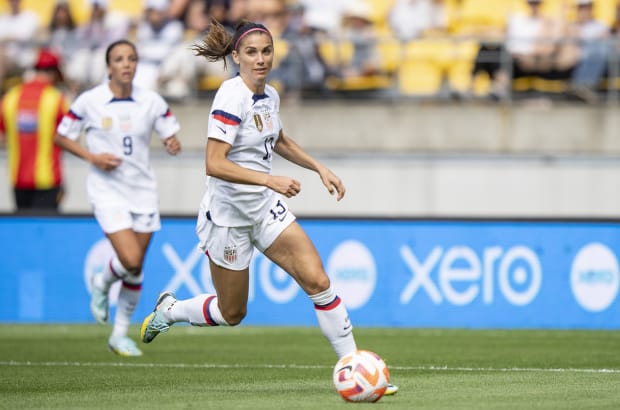
Erick W. Rasco/Sports Illustrated
After being at the forefront of the USWNT’s pay equity fight, the 34-year-old launched the Alex Morgan Foundation to empower girls and support mothers. Laura Wolf Stein, who helps run the foundation, says they want to address “why girls don’t enter or stay in sports after 12 or 13.” Some factors are economic; others social. All are fixable if someone leads the way. —Michael Rosenberg
LeBron James
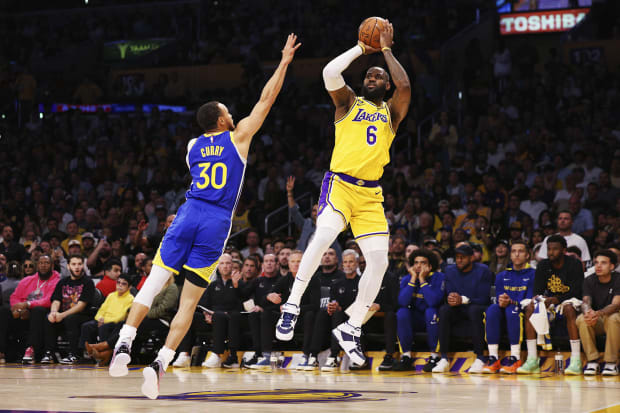
Harry How/Getty Images
In February, the four-time NBA champ broke the league’s all-time scoring record by surpassing Kareem Abdul-Jabbar’s 38,387 career point total. But even without a basketball in hand, James, 38, is a standard bearer, by repeatedly giving athletes new ways to think about business and how they use their star power. In 2020 he created his own film and TV production company, SpringHill. He’s inked shorter contracts to maintain flexibility and force accountability on how teams build around him, and helped set a precedent for superstars signing on to play alongside one another. (His desire to play with his son Bronny could shape NBA roster decisions for the next two years.) None of this gets into James’s social justice work or the thing that he claims to be most proud of: In ’18, his foundation opened the I Promise School in Akron, Ohio, which serves at-risk students and offers career-placement help for the parents of the children. —C.H.
Shohei Ohtani
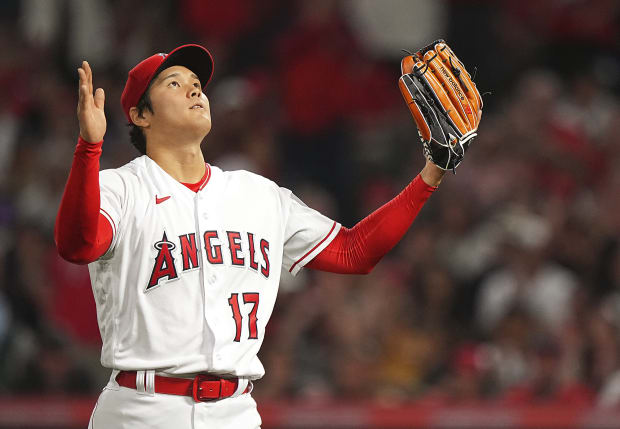
Erick W. Rasco/Sports Illustrated
He is the most valuable player in baseball, earning $30 million this year to hit and pitch, and another $40 million in endorsements as the game’s biggest international star. As a free agent at age 29 after this season, his value is going to reach record heights—and the chase to sign him could reshape the game’s power balance for years to come. After six years with the Angels, Ohtani will attract a bidding war among the Angels, Dodgers, Padres, Giants, Yankees, Mets, Red Sox and any other team willing to go well beyond the record $426.5 million contract owned by current teammate Mike Trout. —Tom Verducci
Layshia Clarendon
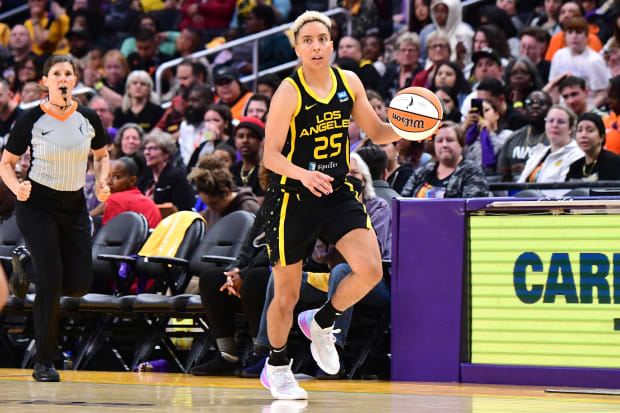
Adam Pantozzi/NBAE via Getty Images
There are few figures in pro sports as unapologetically vocal as the Sparks guard, who uses all pronouns. The 10-year WNBA veteran is the league’s first openly transgender player and has used their own experience to advocate for the inclusion, safety and support of LGBTQ athletes. Clarendon, 32, went public with his top surgery in 2021, writing in an Instagram post, “my freedom is your freedom because none one of us are free until we are all free.” That perfectly sums up Clarendon’s ethos as a groundbreaking figure in the league and an unwavering champion for progress in sports. —Clare Brennan
Tiger Woods
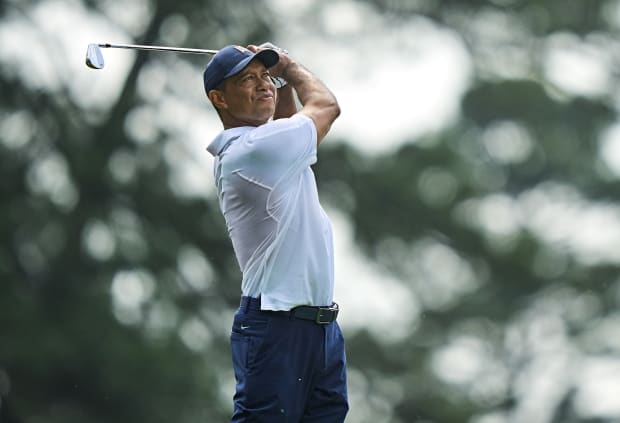
Erick W. Rasco/Sports Illustrated
The video lasted all of three seconds, but there could have been a thousand questions packed into that short glimpse of Woods swinging a golf club. Posted to his Twitter account in November 2021, it was the first time the public had seen him in action since his horrific car crash nine months earlier. It garnered nearly eight million views and helped him earn an $8 million bonus from a PGA Tour fund that rewards players for social media engagement. A year later Woods again was awarded the top prize, increased to $15 million, despite having played just nine official rounds of golf in ’22.
It speaks to Woods’s popularity as he approaches his 48th birthday this December. He rarely plays, yet still has great influence. Much of it is due to his 82 PGA Tour wins, his 15 major titles and the way he dominated the game for so many years. But Woods is also popular among his peers and took on a leadership role in response to the LIV Golf threat that will result in more purse money overall. And if money is power, Woods’s impact will be lasting: According to Forbes, last year he joined LeBron James and Michael Jordan on the short list of athlete billionaires. —Bob Harig
Lionel Messi

Clive Brunskill/Getty Images
From his magic on the field to his money and majestic presence off it, Messi reigns as a fixed figure of influence in the world’s most popular sport. No player owns more hardware than the 43 trophies he has accumulated across his career, which includes 12 league titles between Barcelona and Paris St.-Germain, seven Ballon d’Or awards and the 2022 World Cup that likely cemented him as the greatest player of all time. The 36-year-old superstar has been ranked in the top three of Forbes’s highest-paid athlete list for eight years running, and his jersey can be found in every corner of the globe—after his departure from PSG to sign with MLS side Inter Miami in early June, his new pink-and-black kit is sure to become a bestseller worldwide. And in terms of sheer influence, no one has made a bigger impact on soccer in the 21st century than the Argentina captain, who reminds the world that no amount of statistical analysis or physical training in today’s modern game can match the jaw-dropping enchantment of pure, poetic
talent. —A.G.
Nneka and Chiney Ogwumike
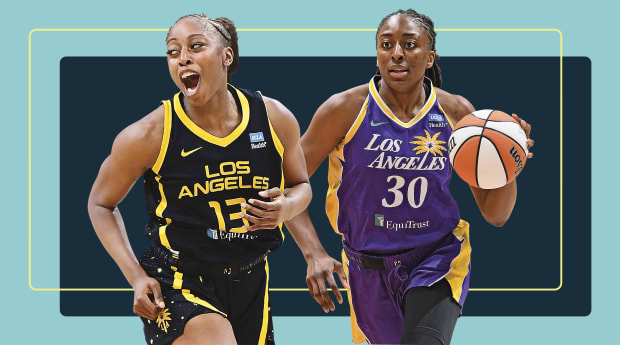
They have shone together in both college (Stanford) and in the pros (Sparks), but the Ogwumike sisters have also blazed their own distinct trails off the court. As president of the Women’s National Basketball Players Association since 2016, Nneka (below, right), deftly led negotiations for a groundbreaking CBA in ’20 that included one of the first comprehensive maternity benefit plans in pro sports, and the 33-year-old is often the voice of players’ public stances on questions of social justice. Chiney, 31, has built a career in media, becoming the first Black woman to host a national radio show for ESPN. And both have dominated on the court. —Emma Baccellieri
Influencers
Jake Paul
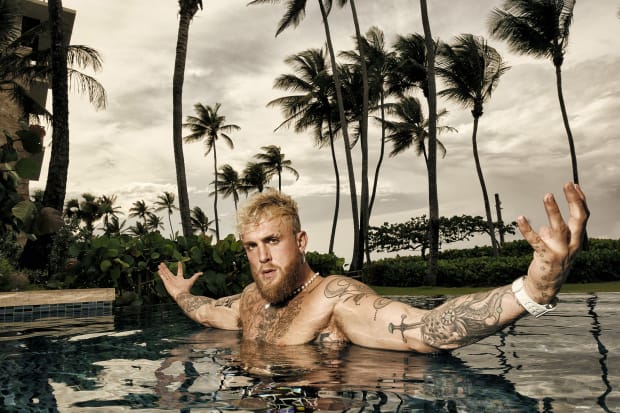
Clay Patrick McBride/Sports Illustrated
How does an online celebrity turn digital fame into game-changing clout? Boxing did more than help a popular YouTuber grow beyond the viral video. It led him to focus his life around a mission to remake combat sports. Read the full August 2023 cover story, by Chris Mannix, here.
NBA on TNT crew
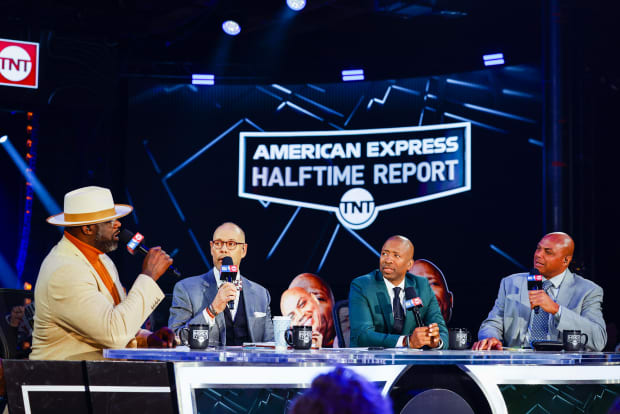
Courtesy of TNT
You’d be hard-pressed to think of any sports program that’s enjoyed the level of familiarity, consistency and laughter-inducing moments that Inside the NBA has. The show has featured host Ernie Johnson for nearly 25 years, and later added former players Shaquille O’Neal, Charles Barkley and Kenny Smith, who provide endless pre- and postgame entertainment. Sometimes the crew angers the players they’re paid to analyze due to their candor and sharp critiques; other times they crack inside jokes or annoy dialed-in, die-hard fans for their lack of attention to detail. But they’ve also spoken poignantly when members of the show have lost loved ones and when societal events have overshadowed basketball. The long-standing and oft-imitated show has also mixed in an array of other voices at times in recent years—most notably WNBA star Candace Parker—but the thrust of the panel remains the same. And it certainly won’t be a surprise if the group ends up being inducted into the Hall of Fame because of their widespread popularity and enduring influence all these years later. —C.H.
The Manning Family
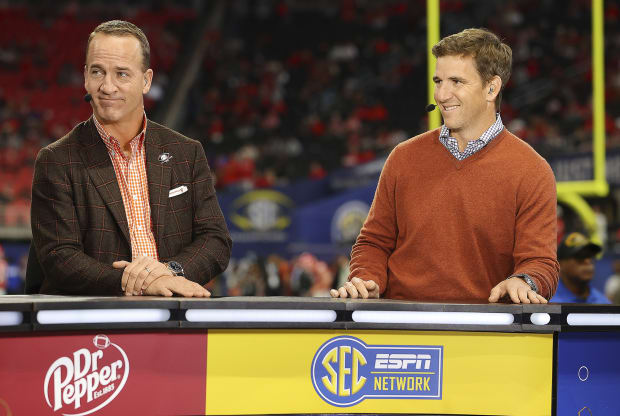
Kevin C. Cox/Getty Images
They were already the royal family of quarterbacking: patriarch Archie, his sons Peyton and Eli (right), and—debuting this fall at Texas—grandson and five-star prospect Arch. But the Manning clan is much more now, the centerpiece of a media empire that has made stars of even the nonplaying members (Cooper, the elder brother of Peyton and Eli, is the funniest one). It’s not just the ubiquitous, often hilarious, ads (Caesars Sportsbook, ESPN, Frito-Lay) that feature some or all of the Mannings. After having huge success with ESPN vehicles Peyton’s Places and the Monday Night Football alternative ManningCast, Omaha Productions—the entertainment company Peyton launched four years after his 2016 retirement has expanded both formats to other personalities and sports. Omaha is now a $400 million production powerhouse. —Stephen Cannella
Olivia Dunne
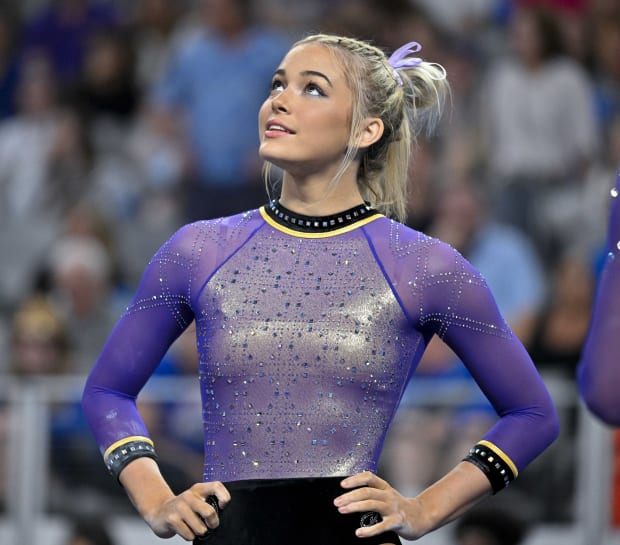
Jerome Miron/USA TODAY Sports
The top NIL earner in NCAA women’s sports, the LSU gymnast has a seven-figure income, thanks to 7.5 million followers on TikTok and 4.1 million on Instagram. Despite predictable backlash—including criticism from Stanford Hall of Fame basketball coach Tara VanDerveer—Dunne, 20, has built a model for athletes to establish a brand, not to mention make money, without the prospect of a hefty professional payday. —Mark Bechtel
The Sportsbooks

George Rose/Getty Images
It was the end of sports prohibition, so to speak, and just as bootleggers and speakeasies were replaced by importers and bars, bookies and OTB parlors gave way to apps and the benign-sounding sportsbooks. Five years ago the Supreme Court overturned the Professional and Amateur Sports Protection Act (PASPA), opening the door to legalized sports gambling in the U.S. Since then, tens of millions of fans have wagered more than $180 billion, not just on games and point spreads, but on individual free throws, at bats and putts. More states now permit sports gambling than ban it. And thanks to mobile technology, it’s no more difficult (or remarkable) to place a wager than it is to order an Uber or an item on Amazon. (Full disclosure: Sports Illustrated is among the many media companies that now partner with sportsbooks.) There are, of course, adjacent perils. Which is why leagues and legislators alike fought legalized sports betting for decades, before their dramatic about-face. The integrity of competition can be undercut by fixing and tanking. Gamblers can grow addicted. Debts can go unpaid. Still, sports gambling is here to stay. And we’re in the early innings. As DraftKings CEO Jason Robins puts it: “While the milestones of legalized sports betting are remarkable, this industry is excitingly still far from being fully realized.” —L.J.W.
Eileen Gu
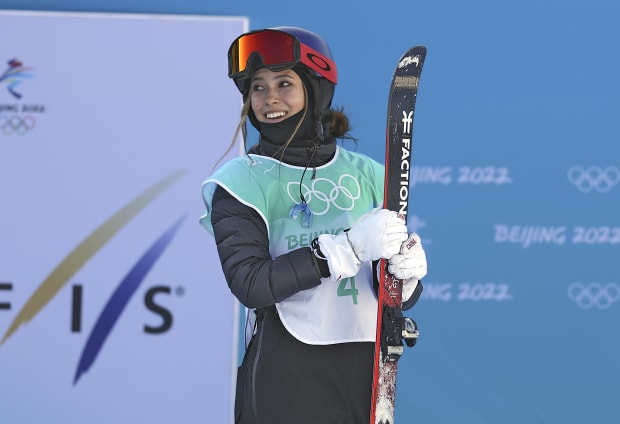
Simon Bruty/Sports Illustrated
San Francisco native Gu, 19, chose to ski for China at the 2022 Beijing Olympics to honor her mother, Yan. Now she is the third-highest-paid female athlete in the world, a social media giant and an ambassador for Salt Lake City’s bid for the ’30 Games. —M.R.
Rayssa Leal
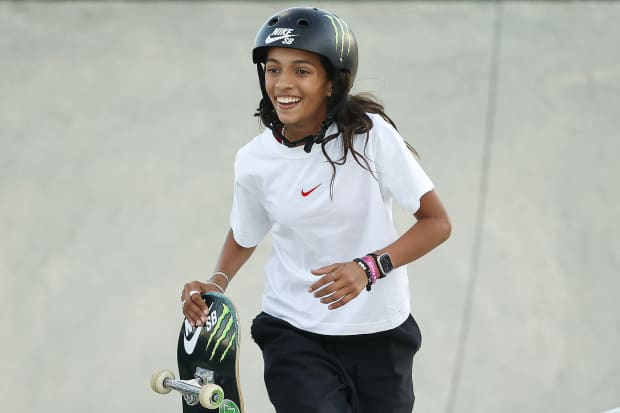
Tim Nwachukwu/Getty Images
Videos of the Brazilian-born Leal skating in a tutu at age 7 went viral. Now 15, Leal has maximized her early fame. She won an Olympic silver in street skateboarding in Tokyo and has 6.4 million Instagram followers, surpassing stars like Naomi Osaka. —Jamie Lisanti
Netflix Doc Makers
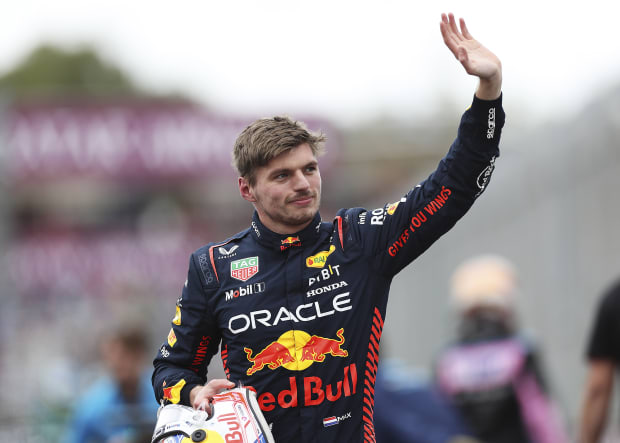
Peter Fox/Getty Images
The documentary series Formula 1: Drive to Survive premiered on Netflix in 2019 and immediately became a sensation. U.S. fans who might not have known their DRS from their MPG were captivated by drivers like Max Verstappen (right). It wasn’t just a boon for Netflix. F1’s popularity soared, and now other niche outfits (the Tour de France, tennis, golf) are hoping their doc deals with the streamer will lead to similar bumps in visibility. You paying attention, curling powers that be? —M.B.
Jay Marine

He’s far from a household name, but Amazon’s global head of sports is a force, as the balance of power in sports media swings from linear to streaming networks. Marine—along with VP of global sports video Marie Donoghue—oversaw the launch of Thursday Night Football on the service last year; flex scheduling and a Black Friday game will elevate the TNF profile further this year. Amazon also has Premier League and WNBA rights. Expect Marine to be front and center when NBA rights are up for grabs in 2025. —S.C.
The Other Streamers

Courtesy of YouTube
Amazon was the trailblazer, but plenty of streaming services have joined the live sports gold rush. Last December, YouTube TV agreed to pay $2 billion a year for the NFL’s Sunday Ticket package. Apple TV+ has deals to air live MLB and MLS games; Peacock has exclusive Sunday morning MLB games; Max has USMNT and USWNT soccer matches. As the streaming landscape grows more competitive, one thing from the linear network heyday holds true: Live sports are still a massive audience attractor. —S.C.
Pat McAfee
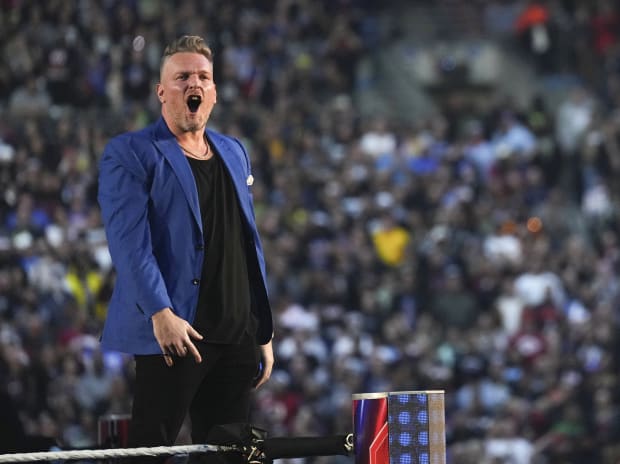
Joe Camporeale/USA TODAY Sports
There isn’t a hotter sports media star today than this 36-year-old. The former NFL punter’s bread and butter is his daily YouTube offering, The Pat McAfee Show, which will move to ESPN in the fall and has built a massive following thanks to his authenticity and interviews. Case in point: Aaron Rodgers’s appearance after his darkness retreat had more than 500,000 concurrent viewers. —Jimmy Traina
Executives
Roger Goodell

Kevin Mazur/Getty Images for YouTube
In May, Goodell arrived in Minneapolis with the owners of the 32 NFL franchises and two proposed rule changes on his spring league meetings agenda: flex scheduling for Thursday night games, a measure rife with questions centering on what’s best for both fans and players, and a kickoff fair catch rule that would inch one of the sport’s signature plays closer to extinction and was uniformly opposed by special teams players and coaches. Both items had been tabled by NFL owners in March, mostly because at the time the proposals lacked the support to go through. The former was voted down by the league’s old guard, the Bears, Packers, Lions, Giants, Steelers and Bengals among them. The latter was soundly defeated, falling far short of 24 votes needed for adoption.
On the first day of spring meetings, Goodell, in his 17th year as commissioner, got the Thursday Night Football flex passed and persuaded eight owners to flip on the kickoff rule. It, too, was approved, on Day 2.
Whether either will have a material effect on the 2023 season remains to be seen. But the journey from opposition to approval for these measures is a telling glimpse into the extent of Goodell’s power and leadership—amd what he considers his main charge, namely to keep the NFL growing into an ever-larger money-making Goliath. The TNF rule will help add value for a streaming partner, which will be important to the league’s next set of broadcast negotiations. The kickoff rule will protect owners—at whose pleasure Goodell serves, it must always be remembered—against concussion liability.
A wise man once told me that to cover Goodell’s NFL, all you have to do is follow the money. And for all his faults—critics point to inconsistencies in his decisions around discipline for franchises and individual players, and he has acknowledged that the league could have been more sensitive in its handling of social justice protests by players—Goodell, 64, can create more ways to make more money than anyone in sports. Which is why his bosses, the owners, are just fine with the job he’s done. Goodell’s current five-year contract, worth up to $200 million, will expire in March 2024. It’s no surprise that as teams were wrapping offseason OTAs and preparing for training camp, this report began to surface: The owners and the commissioner are close to agreeing on a contract extension that will keep him on the job until ’27. The Goodell era, and his influence on the sports landscape, is far from over. —Albert Breer
Greg Sankey
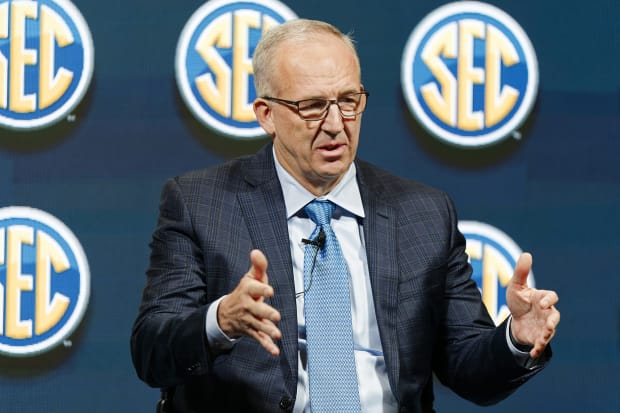
Marvin Gentry/USA TODAY Sports
The SEC, winners of 13 of the past 17 national football titles, is a money-making beast that lords over college sports. As leader of the nation’s richest football conference, Sankey, 58, likely has more sway than anyone over the future of the college game. He’s known as well read and as a deep thinker who’s patient in his decision-making. Now he must juggle the needs of revenue-generating football powers with nonrevenue Olympic sports that are still important to the college model. —Ross Dellenger
The Other Commishes
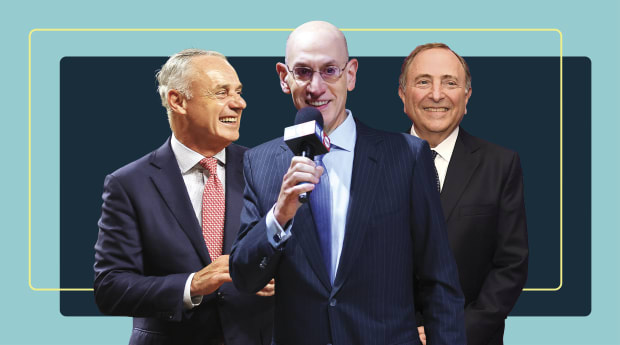
It’s the NFL and everyone else in terms of economic might and cultural clout, but the other members of the Big Four of men’s North American sports are behemoths in their own rights. In 2022, MLB raked in a record $10.8 billion in revenue, the NBA topped $10 billion for the first time and the NHL reached a record $5.3 billion. Combine the revenues of the three leagues—with their increasingly globalized footprints—and you’d have an economy that ranks around 100th in the world in GDP.
This growth is driven by leaders who have put unmistakable stamps on their sports. Rob Manfred, 64, presides over an era of evolution in MLB, having spurred several rule changes this year to improve the sport. Next up: reshaping how games are delivered to fans as the regional network model collapses and streaming grows.
In his nine years as NBA boss, Adam Silver, 61, has negotiated two CBAs and steered the league through several thorny crises. Next year he’ll close on a new broadcast deal that could be worth $75 billion. Two years ago Gary Bettman, now 71, negotiated new broadcast deals for the NHL, doubling what the league had been getting from national TV partners. In his 31st year atop the NHL, he’s the longest-serving commissioner ever in the Big Four. Booing him when he hands out the Stanley Cup is an annual tradition, but his impact is undeniable. —S.C.
Charlie Baker
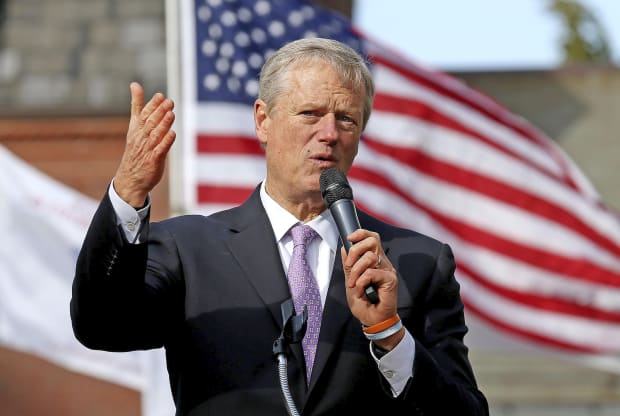
Matt Stone/MediaNews Group/Boston Herald via Getty Images
The former governor of Massachusetts, Baker, 66, replaced Mark Emmert in March as the new leader of the ever-evolving NCAA, with a primary goal of pushing Congress to pass college athlete legislation. A Republican with over a 70% approval rating in a Democratic state, Baker is known as a pragmatic thinker who can work with both sides in negotiations on the Hill. His political clout will steer the NCAA during a tumultuous time in college sports, where its role has never been more in question. —R.D.
Jimmy Pitaro
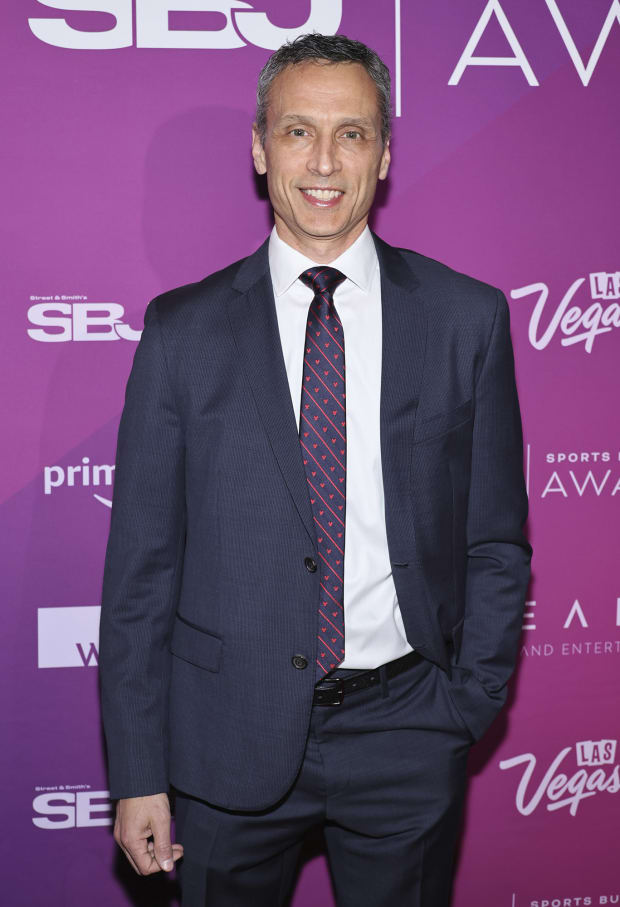
It may be somewhat of a rebuilding era for ESPN, with rights fees up, subscribers down and a new business model aimed at going direct to the consumer rather than relying on the fraying cable bundle. But for all the flux and roster turnover, ESPN remains a media, sports and entertainment giant. And by extension, the figure in charge still wields great power. Currently, that’s chairman Pitaro, a straight-talking New Yorker whose recent wins include repairing the network’s relationship with the NFL—ESPN and ABC are now in the Super Bowl rotation—and signing on Peyton and Eli Manning for the alternative ManningCast during Monday Night Football. He’s also nourished the growth of paid subscription service ESPN+ and will soon build the network’s share of NBA rights. —L.J.W.
Michele Kang

Brad Smith/ISI Photos/Getty Images
Unprofessionalism, improper investment and front office negligence have often plagued the National Women’s Soccer League since its launch in 2012. But that began to change with the Washington Spirit owner. The CEO of Cognosante, a health care technology company, Kang, 64, has not only helped shift the demographics of NWSL ownership, but also elevated its professional standard. Now she has her sights on something even more ambitious. In the spring she bought a majority stake in Olympique Lyonnais Féminin with the intention of creating an international women’s soccer organization. The women-owned, multiclub firm will be the first of its kind, advancing how the sport is furnished globally. —C.B.
Dana White
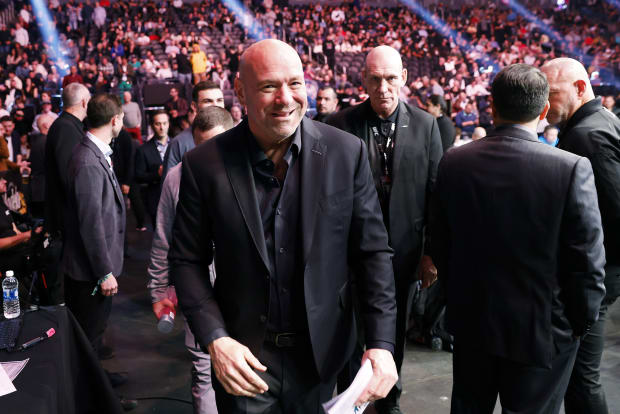
Sean M. Haffey/Getty Images
Since becoming UFC president in 2001, White has legitimized mixed martial arts, making fights sufficiently mainstream to air on ESPN and ultimately leading to WME’s purchase of the promotion for $4 billion in ’16. This would have been one of the great sports business success stories—except the round continued. In April, WME merged UFC with WWE to form a $21.4 billion public company—more than half of the UFC’s value. Through it all, White, 53, has been the backbone. He polarizes. He pontificates. His favorite words are expletives. He is also one of the most influential and longest-serving sports executives of our time. —L.J.W.
Gianni Infantino
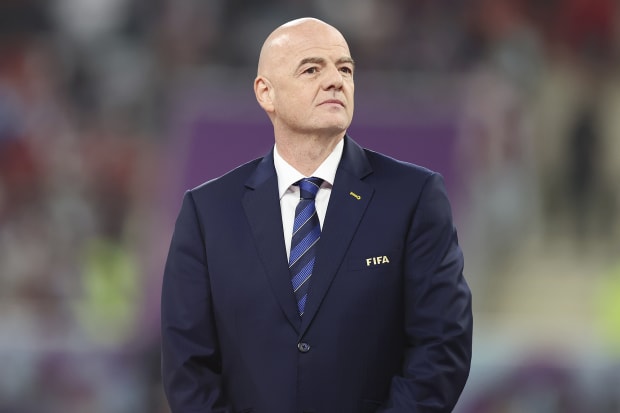
Youssef Loulidi/Fantasista/Getty Images
The FIFA president may not be soccer’s most popular figure, but there is no doubt he’s the most powerful. Infantino, 53, led the push to expand the men’s World Cup (from 32 teams to 48 in 2026) and the women’s, from 24 to 32 teams this summer. His critics point to his defense of Qatar over human rights issues, his previous link to Vladimir Putin and expansion goals that may put player health at risk. His supporters herald FIFA’s stability, its $4 billion reserve and $11 billion revenue forecast through ’26. He could remain in power through ’31. That’s a long time to dictate the direction of the world’s most lucrative sport. —A.G.
Cindy Parlow Cone
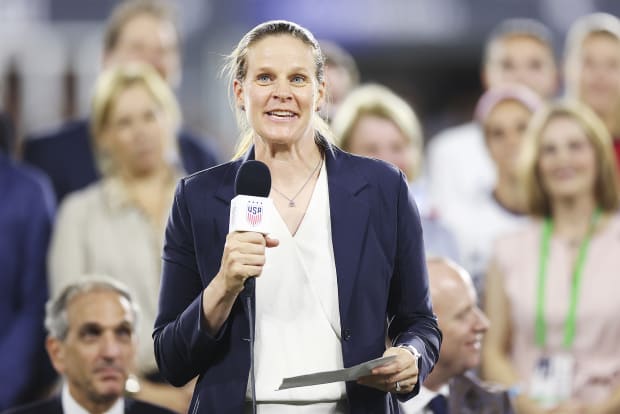
Tim Nwachukwu/Getty Images
Appointed U.S. Soccer president in 2020, Cone, 45, has a powerful voice as a former player and grasp of the game’s pay structure that were crucial in the USWNT’s ’22 equal pay feat—an outcome that the two previous leaders never attained. —J.L.
Stan Kroenke
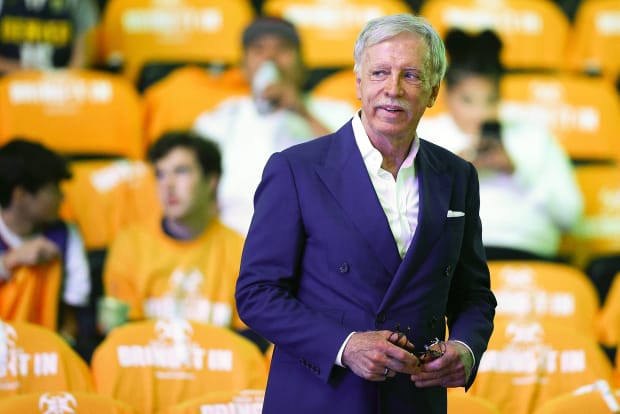
Isaiah J. Downing/USA TODAY Sports
In 2012 the Missouri-born billionaire was the only figure anchored in four major leagues. More than a decade later, Kroenke, 75, has only added clout and prestige—especially as his three U.S. teams (Rams, Nuggets and Avalanche) have each won titles since ’21. —L.J.W.
Tamika Tremaglio

Shareif Ziyadat/Getty Images for This is Dope
In January 2022, Tremaglio took over as executive director of the National Basketball Players Association, succeeding Michele Roberts. Her first task: Negotiate a new, multibillion-dollar CBA. That April the union closed on a deal that will ensure labor peace until ’29. A former Deloitte exec, Tremaglio, 53, was recruited for her business background. Union president CJ McCollum told The Washington Post that she puts players in a position “to think more like CEOs.” In other words: Make more money. With gambling and technology creating more potential revenue streams, she is charged with finding them. —C.M.
Cam Weber
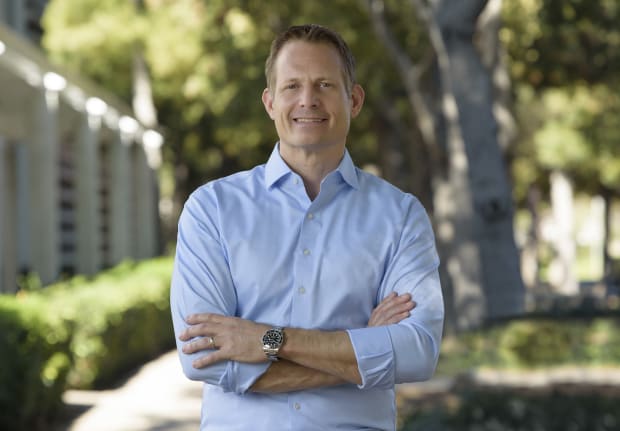
Courtesy of EA SPORTS
Serving as EA Sports executive VP and general manager since 2018, Weber has championed the representation of women’s sports across the company’s portfolio of games. In July ’22, Chelsea forward Sam Kerr became the first woman to be featured on a FIFA global cover (alongside Kylian Mbappé of PSG, who stood alone on the ’21 and ’22 editions). Earlier this year EA Sports announced a partnership with the NWSL to bring all 12 teams to the game, while a new technology is helping make women’s players move more authentically. Under Weber, EA Sports games are played by more than 200 million worldwide. —J.L.
Icons & Leaders
Kobe Bryant
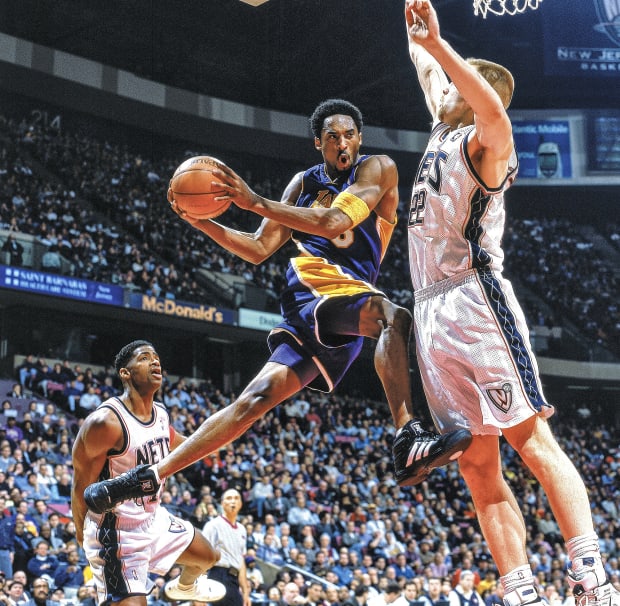
Manny Millan/Sports Illustrated
It was a Sunday, the worst day, Jan. 26, 2020, when Kobe Bryant; his 13-year-old daughter, Gianna; and seven others died in a helicopter crash. Bryant wasn’t just a five-time NBA champion, Hall of Famer and all-time great; Kobe spread basketball. But he also, specifically, spread women’s basketball. He called Breanna Stewart after she ruptured her Achilles tendon to offer guidance on an injury he understood too well. He wore WNBA gear, proudly and in public. He founded the Mamba Sports Academy, which provided access to sports for girls and other children. “In our game, no one had more impact,” Skylar Diggins-Smith says. Each female player saw in him the title of his book, The Mamba Mentality. Each also saw that mentality in themselves.
They weren’t alone. Kobe wrote TV and commercial scripts. Kobe produced documentaries. Kobe read Harry Potter. Kobe befriended regular folks, writers, directors, celebrities. Kobe woke up early, tried new things, excelled at everything. Kobe challenged himself, in basketball and outside it, impacting people in numerous industries, various countries and different economic stratospheres along the way. His death, Diggins-Smith says, forced everyone influenced by him to reach deeper and push for more, and Diggins-Smith believes that stems from the rare duality baked into Kobe, part of his genetic code. He was the most savage competitor in sports at least since Michael Jordan retired. But he was also the most relatable celebrity alive.
Read more on Kobe’s everlasting influence, by Greg Bishop, here.
Allyson Felix
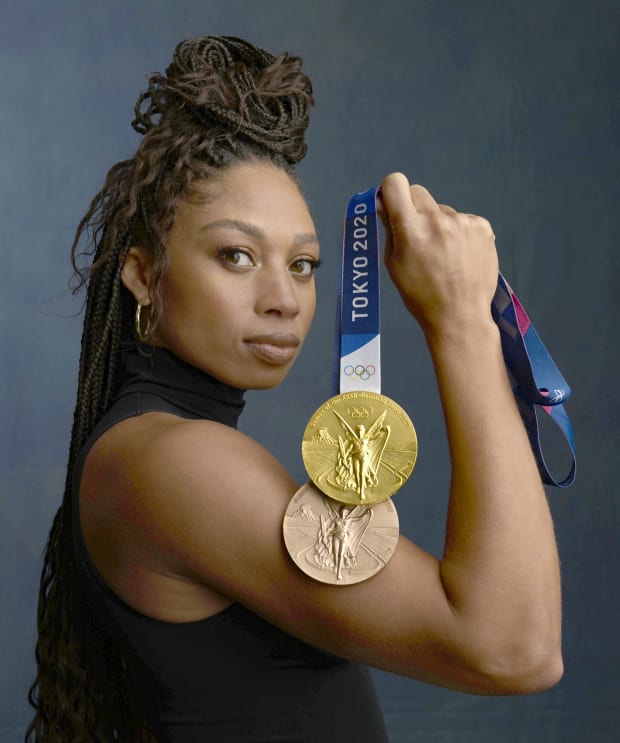
Kohjiro Kinno/Sports Illustrated
After 19 years and 11 medals (seven gold) at five straight Olympics, track and field’s most decorated woman retired at age 36 in July 2022. But one can argue that Felix’s true legacy doesn’t have anything to do with spikes or speed. She says she found her “why” for competing once she was pregnant with her daughter, Camryn, who was born two months early via emergency C-section after Felix developed severe preeclampsia. Since then, Felix has harnessed her voice to tirelessly fight for improved maternal health standards for all. —J.L.
Serena Williams
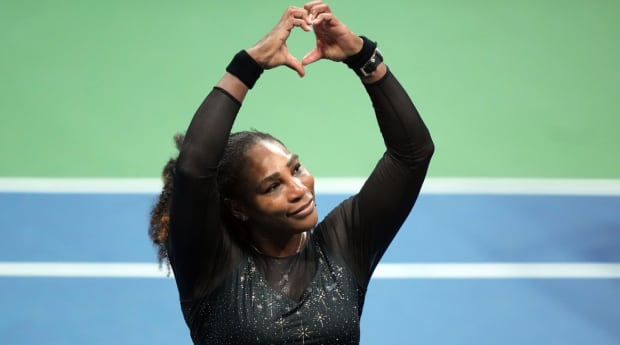
Danielle Parhizkaran/USA TODAY Sports
Once eclipsed by other players—first Maria Sharapova, then Naomi Osaka—in off-court income, Williams, 41, has turned the tables. While still playing she launched Serena Ventures, which invests more than 75% of its funds in women- and minority-owned companies. She still profits from endorsements, but also takes equity stakes in early-stage brands in exchange for cash. Thus, the $95 million she made will be dwarfed by her post-tennis earnings. Take that, Sharapova. —L.J.W.
Michael Jordan
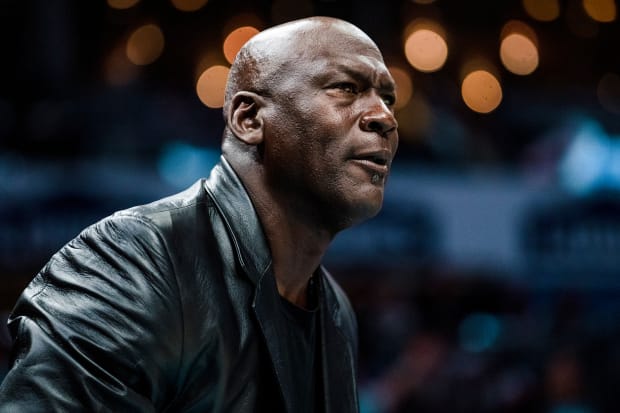
Jacob Kupferman/Getty Images
Two decades after his last NBA game, Jordan, 60, remains one of sport’s most recognizable—and successful—figures. His Jordan Brand dominates sneaker culture, and his iconic Jumpman logo can be seen on jerseys everywhere—including Paris Saint-Germain. The first former NBA player to own a team and the league’s only Black majority owner, he recently sold his stake in the Hornets for $3 billion—and he still controls a NASCAR team. —M.B.
Billie Jean King
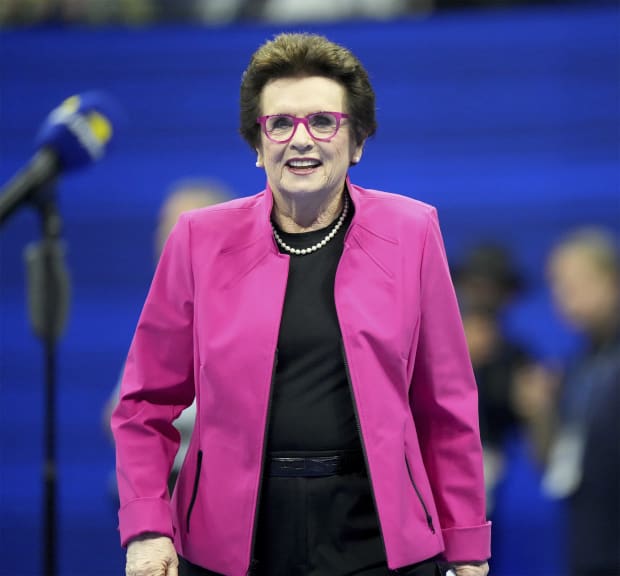
Erick W. Rasco/Sports Illustrated
This summer marks 50 years since the 1973 U.S. Open became the first sporting event in history to offer equal prize money for the men’s and women’s winners, a momentous step forward that was set off by King’s emphatic call for action a year earlier. A half century later, King, 79, is still firmly rooted in the fight for equality. She was a vital resource and advocate for the USWNT during their pay equity fight, and her Women’s Sports Foundation is spearheading the growth of women’s sports today. —J.L.
Dawn Staley
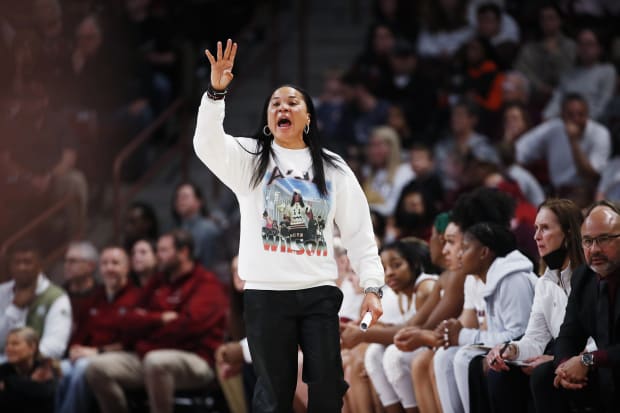
Chris Keane/Sports Illustrated
While her playing career was impressive, Staley, 53, has cemented her legacy as a coach. She’s transformed South Carolina into a powerhouse and she uses her platform to uplift others. When she won the NCAA title in 2017, for instance, she cut up her piece of the net and shared it with every Division I Black female coach. —E.B.
Deion Sanders
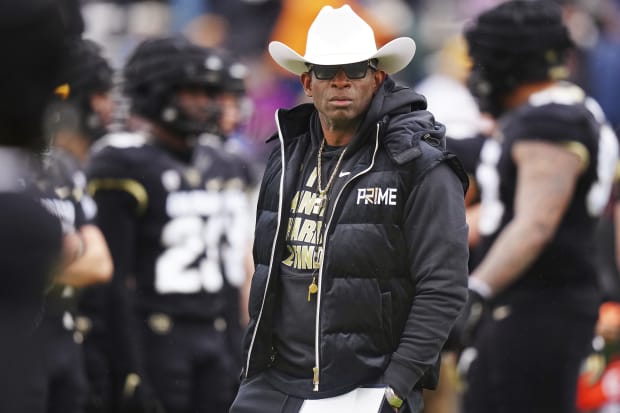
Ron Chenoy/USA TODAY Sports
Whether he is all hat and no cattle as the new coach at Colorado remains to be seen, but the jolt of interest Sanders, 55, has injected into a previously irrelevant program underscores the power of his personal brand—and his willingness to disrupt the status quo. After his leap from FCS Jackson State to the Pac-12, he rebuilt the 1–11 Buffaloes, adding his quarterback son, Shedeur, and defensive back Travis Hunter, the nation’s 2022 No. 1 recruit. Intense curiosity about the Coach Prime Experience has landed the Buffs coveted TV slots for their first three games. —Pat Forde
Dwyane Wade and Gabrielle Union
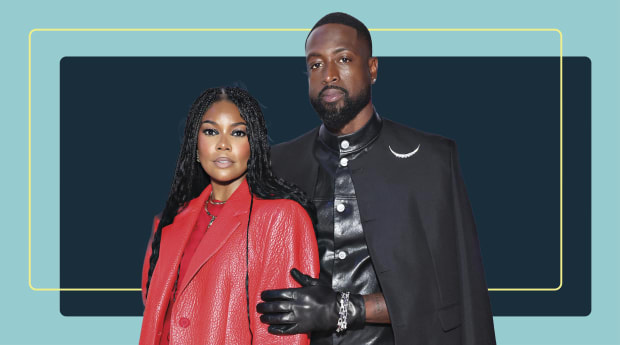
During an acceptance speech at the 2023 NAACP Image Awards in February, Union, 50, stood next to
her husband and retired NBA star, Wade, 41, and posed a question to the crowd: “Will we fight for some, or will we fight for all of our people?” The duo—whose 16-year-old daughter, Zaya, came out as transgender in ’20—have been at the forefront of “a new era of activism,” advocating for acceptance and the protection of LGBTQ rights, particularly for the Black trans community. —J.L.
Dealmakers
Nicole Lynn
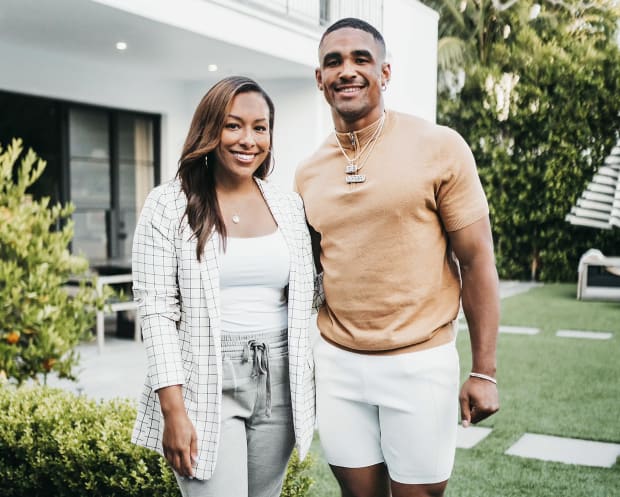
Courtesy of Klutch Sports Group
Lynn is an influencer of elevating influence. Only 34, she’s a lawyer, author, public speaker and, as president of football at Klutch Sports Group, the agent for NFL stars Jalen Hurts, Myles Garrett, Quinnen Williams, Will Anderson Jr. and Bijan Robinson, to name just a few.
Her path from the NFL hinterlands to industry titan took 10 years, a decade that saw Lynn go back to college, intern, scuffle and scrap, change jobs, work for a famous rapper’s agency and land an MVP candidate through an Instagram DM. Year after year, she had to work to infiltrate a landscape where the best players went to the same agencies for representation.
Lynn grew up in Tulsa, raised around sports. She pursued cheerleading and rugby and went to Oklahoma to study business management. While on campus, she met her husband, Gabe, a cornerback for the Sooners who played briefly in the NFL. Their friends were mostly athletes.
The stories she heard from them were a picture of mismanagement. Lynn recalls one, from an older football player who was drafted into the NFL but didn’t last long. This player was beloved. But he returned to campus having already spent all his NFL earnings. He would struggle for years with his mental health. Lynn heard recently he might be “living on the streets.” And, because she is unafraid to tackle problems that lack obvious answers, she looked at a “really terrible, terrible situation” and thought, I’m gonna be an agent.
Lynn wanted to teach players financial literacy, so she completed her business degree, became a financial analyst and went to work on Wall Street. But the financial advisers she met trafficked primarily in portfolio management. She wanted to empower clients instead. She created a “rookie school” called Fishers of Men to connect prospects with mentors and teach life skills: how much to tip at restaurants, how to draft professional emails, how to check a credit score. Before this year’s draft, where she represented Anderson (third pick) and Robinson (eighth), her prospects met once a week for a few hours.
If you liked the movie Jerry Maguire, Lynn’s narrative echoes that film’s—except hers is not based on a true story. It just is. Hurts evolved from a second-round question mark to MVP candidate in only his third NFL season. Lynn negotiated his extension this spring—after asking on social media whether anyone knew where to find a “Brink’s truck”—and netted a critical no-trade clause (the first granted by the Eagles) and $179.3 million in guaranteed cash. The average annual value, $51 million, briefly marked an NFL record.
But all that isn’t why Hurts calls Lynn (pictured together, below) a trailblazer. It’s because she is a Black woman. It’s because she has represented female athletes and analysts for free. Because she chose to empower clients, rather than dictate to them. Because she wrote a book and takes sledgehammers to stereotypes.
Still, for all of her firsts, and there are many—first Black woman to land a top-three pick, first Black female agent with a player in the Super Bowl, arguably the most successful female agent in history, already—Lynn is more than a trailblazer. Those firsts can become more like qualifiers. She requires no qualifications beyond this: elite agent. —G.B.
Rich Paul
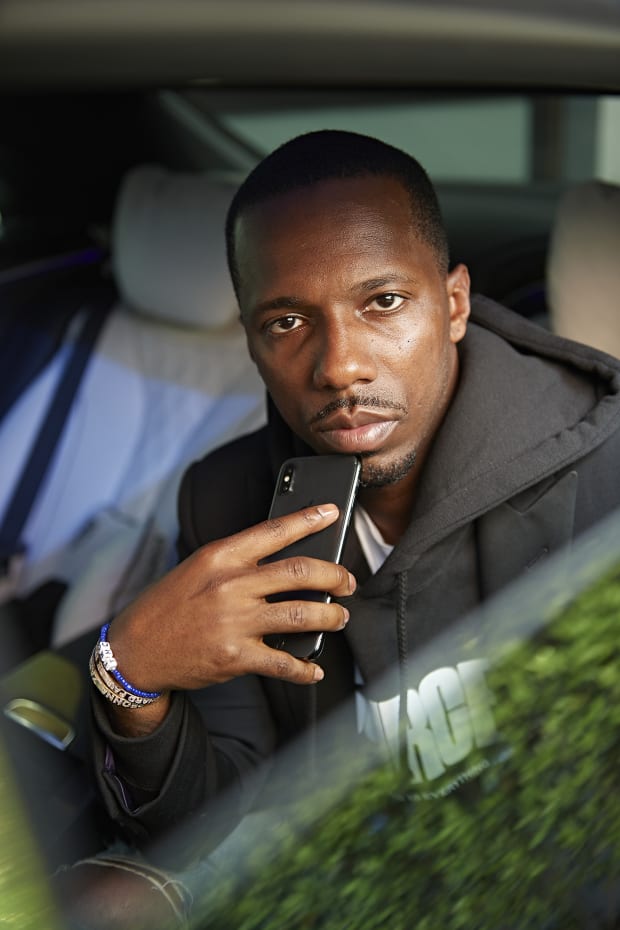
Robert Beck/Sports Illustrated
His forthcoming memoir is titled Lucky Me, and there are, undeniably, strokes of good fortune in Paul’s unlikely story. At 21, he met 17-year-old LeBron James in an Ohio airport. James liked the cut of his jib (or his retro Warren Moon jersey, anyway); the two became friends, then business partners and have been together ever since. But Paul, now 41, possesses skill in addition to luck. His professionalism and ability to see around cultural corners enabled him to become a premier sports agent and media entrepreneur. His Klutch Sports Group agency may be the biggest behind-the-scenes force in the NBA. —L.J.W.
Scott Boras
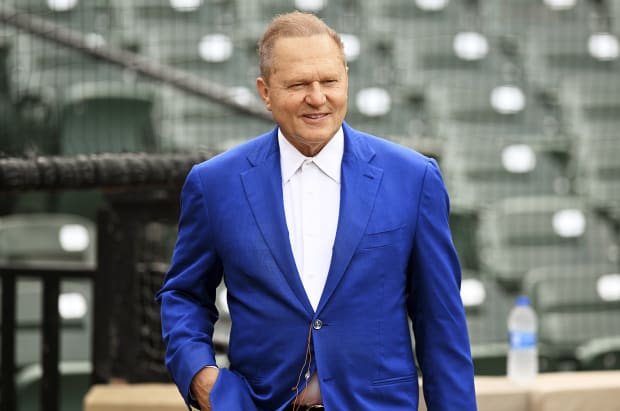
G Fiume/Getty Images
For more than 40 years, Boras, 70, has been one of the top power brokers in baseball. Today, his influence is as strong as ever, thanks to his continuing ability to attract elite talent—such as Bryce Harper and pitchers Gerrit Cole and Max Scherzer—and his powerful voice with the MLB Players Association. In just two months last winter, he secured $1.09 billion in contracts for 12 players, including Padres shortstop Xander Bogaerts, Twins shortstop Carlos Correa and Yankees ace Carlos Rodón. —T.V.
Nez Balelo
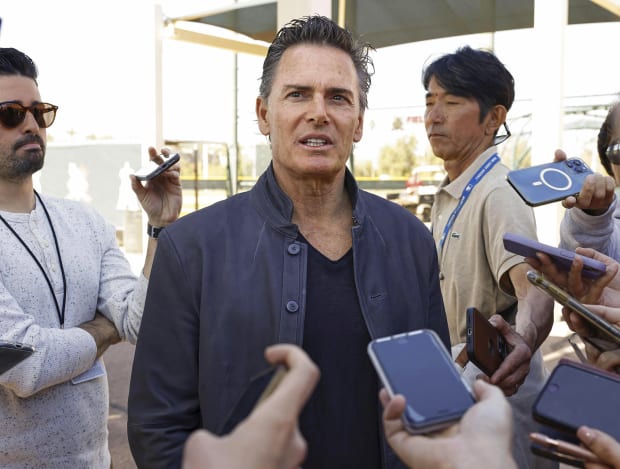
Kyodo/AP Images
A former infielder in the Mariners’ minor league system whose career was cut short due to injury, Balelo joined Creative Artists Agency in 2006 and helped build its baseball division, which he has headed for more than a decade and includes a roster of 30-plus clients. As the agent for Angels star pitcher Shohei Ohtani, the 60-year-old Balelo will negotiate this offseason what figures to be the largest contract in baseball history, if not more than the $503 million deal for Patrick Mahomes that is currently the most lucrative in North American sports. —T.V.
Nasser Al-Khelaifi
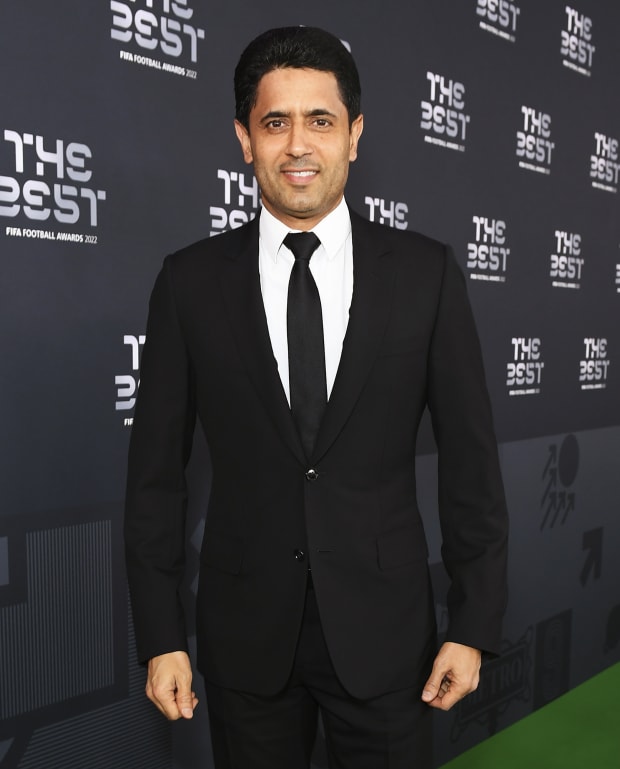
Joe Maher/FIFA/FIFA via Getty Images
The son of a pearl fisherman in Qatar, Al-Khelaïfi, 49, did not grow up around wealth. But in his 30s, he became chairman of Qatar Sports Investment, an arm of the national sovereign wealth fund, then head of beIN, the Qatar-based sports network. As president and CEO of Paris St.-Germain, Al-Khelaïfi reset the transfer market by signing the likes of Kylian Mbappé, Lionel Messi and Neymar. Al-Khelaïfi’s power—and wealth—keeps growing; he’s purportedly worth $8 billion. —L.J.W.
Cory Booker
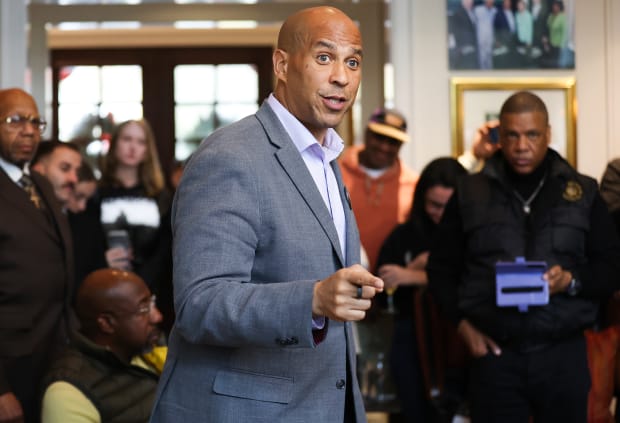
Justin Sullivan/Getty Images
A Democratic senator from New Jersey and a former Stanford tight end, Booker, 54, has been at the forefront of the athlete compensation debate on Capitol Hill. Some see him as a thorn in the NCAA’s side, fighting for radical changes to college athletics. He supports schools sharing revenue with athletes and opposes legislative provisions that assist the NCAA, such as antitrust protection. He personifies a movement that is chaotic and sometimes messy, working to reshape the NCAA as we know it. —R.D.
Arctos Sports Partners

You don’t have to be Jerry Jones or Steve Ballmer to realize value from sports ownership. There are minority owners as well, whose investment appreciates with each new sale and media rights deal. Few know this better than Arctos Sports Partners, a Dallas-based private equity ship led by Doc O’Connor and Ian Charles (above) that has taken minority stakes in more than a dozen pro teams, including the Dodgers, Cubs, Lightning and Warriors. This spring, Arctos reported roughly $6.7 billion in sports assets, a spike of 69% from 2022. —L.J.W.
Saudi Investment Fund

MAZEN MAHDI/AFP/Getty Images
Saudi Arabia may never have won Olympic gold, but it does have an abundance of another commodity: oil. And that oil money has transformed this Middle East kingdom into an ascending, if unlikely, power in global sports. The Saudi Public Investment Fund, among the world’s largest, controls Al-Nassr, the club that recently signed Cristiano Ronaldo to a $200 million a year contract—roughly the annual playing wages of LeBron James, Steph Curry, Aaron Judge and Patrick Mahomes combined. Then there is LIV Golf, the breakaway tour that will soon merge with the PGA Tour—and maybe remake it with the help of a massive Saudi-backed investment. As no less than Tiger Woods says, Saudi Arabia is “an endless pit of money.” The country’s minister of sport, Prince Abdulaziz bin Turki Al Saud (above), says it’s driven by a desire to promote health and wellness. Others, more cynically, cite this as “sportswashing,” a country’s attempt to launder its image by using games and athletes. In the end it may not matter, especially if Saudi Arabia wins the right to the 2030 World Cup. —L.J.W.







